We are a generation of young soldiers from the years of marching and fighting in Truong Son. During the years we held guns, it must be said that the life of a soldier was very rich. Besides backpacks and guns, there were also countless songs, strong and full of love, as if reserved for us soldiers. Those songs were very exciting and full of spirit. One of those songs, which it seemed that in any unit, any soldier often sang before every meeting, activity or march... was Through the Northwest.
There is a very strange thing that keeps singing, but not many people know the author. Singing, feeling excited, seeing the fight more enthusiastically, and that is enough. The song was written about the days of fighting the French, written about the distant Northwest, but sung on Truong Son during the days of fighting the Americans, it is still close, intimate, just like the towering mountains of thousands of miles away, with many difficulties to overcome, it is Truong Son, it is these days, even the sincere, simple way of expression of our soldiers obeying the Father's orders is still received with sincere, emotional feelings.

Musician Nguyen Thanh - Photo: NNT
I have a personal interest: finding the authors of songs rich in fighting spirit, strongly impacting the lives of soldiers. And so, one afternoon, I met Nguyen Thanh - author of the song Through the Northwest...
Musician Nguyen Thanh said: "I wrote the song "Passing the Northwest" in about an hour, on top of Khau Vac pass, on a marching night...".
One hour, but his songs have been and will be many times more vital than that time. To have that one hour, he had marched to fight the enemy in the Northwest at least twice, and had a life in the National Defense Army since he was not yet fifteen years old. That was in 1945, the August Revolution broke out, Nguyen Thanh was a student in Hanoi . One day, the red flag with yellow star and the song Tien Quan Ca attracted him to join the protest marches, going from the Opera House, flooding into the Northern Government to seize power.
Nguyen Thanh's life as a soldier began that day, and soon after that he became the deputy platoon leader of a cadet platoon with a cap with a gold-bordered star, blue shorts and socks, and a yellow shirt. The echo of this soldier's life is the rhythmic tapping of yellow shoes on the road, and the clanking of the rifle on his belt...
The resistance war broke out. The young cadet followed the Western army to the front. He participated in battles against the army led by Curian with the legend they made up: guns that could not be penetrated...
Crossing the river, mountain, and clouds
The Western army marched forward.
The first battlefield, at least once, Nguyen Thanh with his immature musical knowledge from his student days wrote that song of the Northwest. That was in 1946, when he had just set foot in the Northwest. The melody of the song was as romantic as his romantic soul.
Then the years of fighting passed. He went to many campaigns, many other lands. In 1949, he became a cadre of the Vanguard Division's shock artists, the 308th Division. In the fall and winter of 1952, he and his shock artists returned to the Northwest to participate in the campaign. The night before the liberation of Nghia Lo, the shock artists with thirteen members stopped in the middle of Khau Vac Pass. Digging tunnels, lighting fires, sitting and discussing the campaign, then hugging each other and waiting for morning, Nguyen Thanh could not sleep. His greatest emotion was: Uncle Ho's order to send troops to liberate the Northwest. In the letter Uncle sent, he talked a lot about the suffering of the people of the Northwest - the land and people that Nguyen Thanh had many memories of...

Troops march to the Northwest - Photo: Thanh Nguyen
The lyrics came rushing in. Mandolin in hand, strummed along, and Nguyen Thanh sat down to sing. The Northwest appeared in words, on paper that night, beside the flickering fire in the hastily dug tunnel, in the sound of footsteps pounding on the campaign, and in the long howling wind on the mountain pass... After writing, too tired, its author fell asleep. Waking up in the morning, he saw Hoan, Phung De, Vu Huong... his teammates sitting and singing enthusiastically. They had picked up his manuscript from the fire! Luckily, the coal had cooled down, so the paper did not burn...
That very morning, the song was immediately performed to serve the troops on the campaign, with mandolins, guitars, bamboo flutes... and the author and his friends stood and sang right on the top of the pass, serving the troops passing by. The song was like a fire, flaring up through each soldier. And that fire gradually spread throughout the troops, from one campaign to another...
When the buffalo herders saw the soldiers singing, they also got into it and sang along with the sound of the buffalo gongs that echoed throughout the liberated fields of the Northwest. There were even blind singers who used it to sing right in the inner city of Hanoi, which was still occupied by the enemy at that time. The song was also passed down to the next generations, that is, our Truong Son soldiers, who used it as a soldier's song during the years of fighting the enemy...
Musician Nguyen Thanh continued:
- In 1954, we were sent to serve in the Dien Bien Phu campaign. One afternoon, in the bunker of the General Command, General Vo Nguyen Giap asked to sing two songs, including Through the Northwest. After listening, the General said: Whoever composed this song deserves a reward! Luong Ngoc Trac reported to the General that he was the author of Through the Northwest. The General shook my hand tightly and asked about my life as a soldier. Shortly after, I was awarded a medal of military exploit...
The years in the Northwest left many impressions on Nguyen Thanh until today, even though more than thirty years have passed. His face is innocent and profound. The most intense things are often kept inside, rarely expressed in words. He talks about himself with difficulty, but when he does, he is honest, often innocent, easy to love, easy to like. His life as a soldier, his artistic life from then on. And his whole life from then on. His wife, Ngoc Thao, a dancer, a television director, is also a cultural actress of Division 316, and the first time they met was because of memories of the Northwest, a battlefield that they were both attached to.
I met Nguyen Thanh again one afternoon in the Northwest. A new battle had come to the mountains and forests here. And Nguyen Thanh was there again. In front of the mountains and forests, he returned to the innocence and emotions of his fifteen or sixteen years old in the Western Army...
- It's been two wars since I've returned here - He said, his voice slightly regretful.
I sympathize with what is deeply moving him. In peace , he returned to Hanoi, in the Song and Dance Troupe of the General Political Department. In the resistance war against the US, he was present in Truong Son, leading a performing arts troupe on this front. When he was assigned to be in charge of the music section of the military propaganda programs of the Voice of Vietnam Radio, the Northwest returned once again with the song he wrote in 1956: The Cat's Flute to the Soldier (Lyrics: Khac Tue).
For military musicians, the land, the battlefield, the hottest and fiercest is where they go. Truong Son to Nguyen Thanh is as attractive and ideal as the old days when he was a calo troupe moving to the Northwest. But during this period, with the work of a performing arts troupe, Nguyen Thanh had too little time to compose. Although he had not composed yet, his musical soul was already intertwined with Truong Son, and he had quietly accumulated quite a lot of emotions and materials.
Until the time of farewell, taking on a new mission, all the memories, all the attachments... flared up strongly. For many years after, despite having many other attractive topics, Nguyen Thanh still devoted much of his feelings and time to writing about Truong Son: Lion No. 3 (lyrics: Ta Huu Yen); Star, lamp, eyes (lyrics: Luu Quang Ha); I have a Truong Son (lyrics: Chau La Viet) and the symphony Truong Son Memories...
Nguyen Thanh is probably the type of musician who is afraid of superficial, fleeting emotions. He usually only dares to pick up a pen or a guitar when his emotions are deeply ingrained and settle into his soul. This way of working hardly gives him a high number of works, but it also excludes him from compositions that are easy to write and easy to forget. That is also the case when he made October Emotions (lyrics: Ta Huu Yen). It was not until more than twenty years later that he wrote about the 308th Division, which he was close to since his days fighting the French, with the inscription: Dedicated to the Vanguard Division.
Night, the night he flew under the bridge
He promised to come back tomorrow.
The waves of the Red River beat on the distant shore, singing forever
Beautiful lyrics, beautiful melody, rich in soulful resonance. Through October Emotions, we see Nguyen Thanh's diversity. He writes lyrically, passionately, but strongly in the marching rhythm. The successive 6/8 and 2/4 beats help him express those feelings well. When he finished writing the song, Nguyen Thanh himself played the piano, sang, and had tears on his cheeks. The fresh memories of his fighting life, deepened over the years, how could they not make him so moved and nostalgic! October Emotions deserves the award given to it: the love and spread of many listeners.
*
Memories of his life and years of fighting once again reawakened in him, as this afternoon he and we sat in the middle of the Northwest front.
Through the Northwest mountains towering far and wide...
Thirty years of marching in song
This morning I went to the Northwest again.
The musician wrote the song "The hair is now silver"
Leaving since the time of the Green-Haired National Guard
Marching through many waterfalls and rapids
Thirty years later, the soul is still blue in the Northwest sky.
A young poet who was sitting with us that afternoon wrote these lines for Nguyen Thanh, when Nguyen Thanh told the above story. Once again, guns were fired at the border, and military musicians marched to battle. Nguyen Thanh was here very early. He had time to write for the troops going to battle today, March to protect the Fatherland's border (Poem by Tran Dang Khoa):
The troops set out again in droves.
I'm used to long-term hardship.
Thousands of years of fighting...
Our fathers' land is our flesh and blood.
Bach Dang country, Dong Da country
Open Bach Dang again, open Dong Da again...
The song had just dried when it was passed along the trenches by the troops. I think, March to Protect the Fatherland's Border is a continuation of Through the Northwest and will also be a "soldier's song" of the years of fighting to protect the border. And from Through the Northwest to March to Protect the Fatherland's Border today are two milestones, in between which is an artist's life, simple, rustic, profound, like the life of soldier Nguyen Thanh...
Chau La Viet
Source



![[Photo] Students of Binh Minh Primary School enjoy the full moon festival, receiving the joys of childhood](https://vphoto.vietnam.vn/thumb/1200x675/vietnam/resource/IMAGE/2025/10/3/8cf8abef22fe4471be400a818912cb85)


![[Infographic] Notable numbers after 3 months of "reorganizing the country"](https://vphoto.vietnam.vn/thumb/1200x675/vietnam/resource/IMAGE/2025/10/4/ce8bb72c722348e09e942d04f0dd9729)

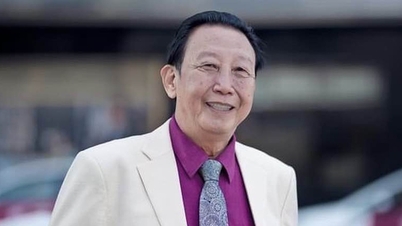

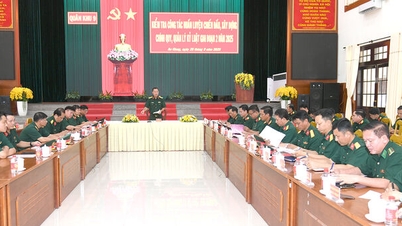









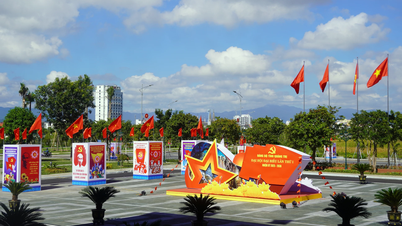

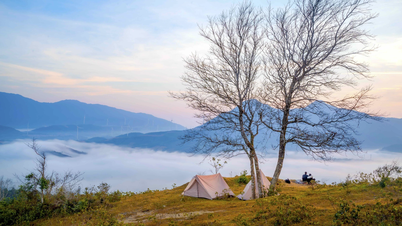








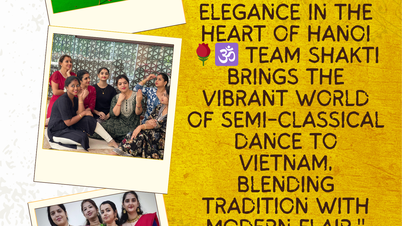






![[Photo] Prime Minister Pham Minh Chinh chairs meeting to deploy overcoming consequences of storm No. 10](https://vphoto.vietnam.vn/thumb/1200x675/vietnam/resource/IMAGE/2025/10/3/544f420dcc844463898fcbef46247d16)
































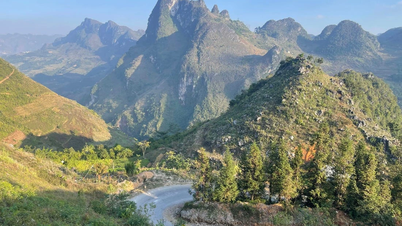




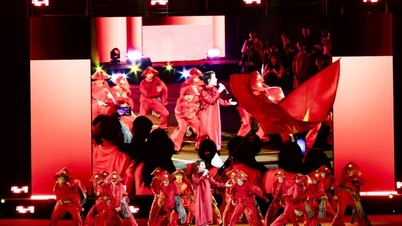












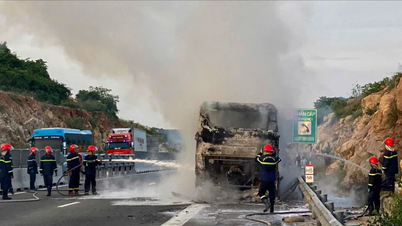















Comment (0)